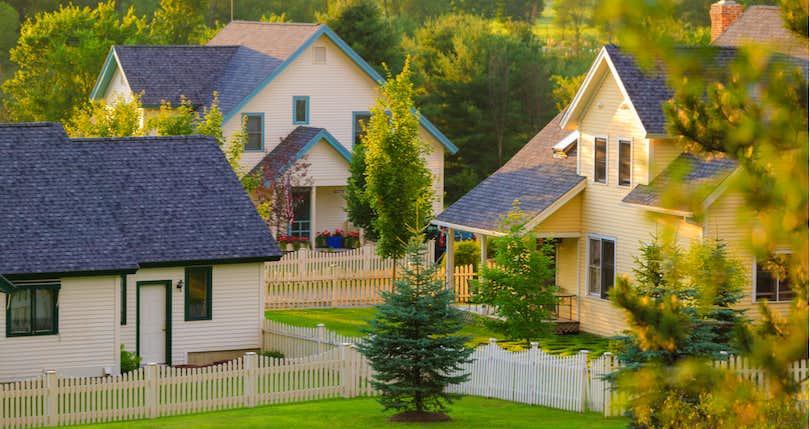Closing costs can sneak up on unexpecting home buyers. In this article, we’re going to explore what exactly closing costs are and how to reduce them to a minimum.

When researching the home buying process, many first-time home buyers are surprised to find that the down payment is not the only out-of-pocket expense they’ll be expected to pay when purchasing a new home. In addition to the down payment, would-be homeowners are responsible for an earnest money deposit and a number of closing costs.
So, what exactly are the Vermont closing costs for buyers? Put simply, they are a number of expenses that must be paid upon closing on a home such as lender fees, title fees, and transfer taxes.
These fees can all rack up a hefty bill. Unfortunately, they’re an unavoidable part of buying a house. While buyers may be able to negotiate who pays for some of the costs with the seller or apply for a program that will provide closing cost assistance, there’s almost no scenario in which a buyer will be completely off the hook.
In order to best prepare yourself for what lies ahead in your home buying journey, it’s important to thoroughly research all the steps in the purchasing process and speak with a qualified real estate agent who can lend you their expert guidance. They’ll be able to inform you of what to expect before you find yourself facing a sizeable bill.
Want to connect with a top-rated, Vermont buyer’s agent? Clever can help! Fill out our online form and we’ll be in touch to answer any questions you might have. We’ll also introduce you to one of our local Partner Agents for a no-obligation consultation.
Closing Costs for Vermont Homes: What to Expect
According to data from Bankrate, closing costs in Vermont average $2,164. However, this does not include variable costs like title insurance, title search, taxes, other government fees, escrow fees, and discount points.
In general, buyers should expect to pay between 2% and 5% of the closing price in closing costs. The median home value in Vermont is $202,300, so buyers should budget at least between $4,046 and $10,115 in closing costs.
While closing costs can be expensive, one of the largest mortgage expenses is the interest rate. Over the life of the loan, a few small percentage points can result in hundreds of thousands of dollars in interest payments.
One of the best ways to lower your interest rate? Shop around and compare lenders! Fill out the form below for a quote from a licensed, local lender – even if you’re pre-approved it pays to compare.
Common Closing Costs for Vermont Home Buyers
Here are some common closing costs that home buyers in Vermont are typically responsible for:
Origination Fee
The origination fee is charged by the buyer’s lender. It pays for the costs of both evaluating the buyer’s loan and processing it as well.
Attorney’s Fee
This fee is paid to the buyer’s attorney to cover any costs associated with reviewing the purchase contract, lender’s commitment letter, seller’s attorney’s Warranty Deed, as well as performing the title search, resolving title issues, and attending the closing.
Initial Escrow Payments
Escrow payments may include a portion of property taxes and up to a full year of homeowner’s insurance paid in advance.
Title Insurance
Title insurance protects the buyer and lender from any losses that may occur should a title dispute arise.
Transfer Tax
Transfer tax is a tax paid on all transfers of property. It is calculated as a percentage of the final closing price of the home. In most states, the seller is responsible for paying transfer tax, however, Vermont does things a little differently and requires the buyer to pay this expense.
Other Costs to Consider
In addition to the one-time closing costs, buyers need to be prepared for the recurring costs associated with owning a home. Here are a few of the most important ones to budget for:
Homeowners Insurance
Homeowners insurance insures your house against major destructive events such as fires. Basic homeowners insurance plans will usually cover hurricane damage, but may not cover damage due to other natural disasters like earthquakes or tornados. Luckily, these are not much concern in Vermont. However, it may be a good idea to upgrade your insurance plan to cover flood damage.
Property Taxes
With a property tax rate of 1.78% on average throughout the state, Vermont’s property taxes rank as eighth highest in the United States. On a home of median value, you can expect to pay around $3,600 each year.
Tax rates vary greatly from region to region. In Caledonia County, the property tax rate is 1.774%, while in Chittenden County it’s only 1.686%. Based on the Vermont median home value, that’s between $3,410.78 and $3,588.80 annually that you’ll have to budget for property taxes.
Utilities
Utilities include gas, water, and electricity. You’ll be paying these every month. Unfortunately, Vermont is one of the priciest states to live in when it comes to utilities — an average monthly utility bill is around $468.
Maintenance Costs
As a general rule, homeowners should set aside 1% to 3% of their homes purchase price each year as a fund for maintenance costs. Home maintenance is a responsibility that comes along with homeownership, and buyers should be aware of these often large and unexpected expenses.
Before purchasing a home, the most important thing to make sure of is whether or not you are financially stable enough to afford a house. Unlike renting, homeownership comes along with quite a few extra monthly and yearly costs, some of which can spring up quite unexpectedly, such as maintenance costs and repairs. While the benefits of homeownership far outweigh the negatives for most people, it’s vital to be sure you are ready to make the long-term financial commitment that comes with owning a home.
How to Save on Closing Costs in Vermont When Buying a Home
Faced with all the expenses associated with buying a home, you may be wondering if there’s any way to save some money. Luckily, there are a few ways you can cut down on your costs:
Negotiating Closing Costs
While buyers are required to pay the Vermont Property Transfer Tax by law, you can negotiate some of the other closing costs for your home with the seller. Making a deal in which the seller pays for certain repairs can also ease the financial burden associated with buying a home.
Working with a qualified real estate agent can be a major help when it comes to negotiating. Real estate agents are expert negotiators who know when to push an issue and when to pull back — working with one is one of the best ways to get a better deal on your new home.
Closing Cost Assistance Programs
The Vermont Housing and Finance Association ASSIST Loan provides qualified home buyers with up to $5,000 in closing cost assistance in the form of a zero-interest second mortgage. Only first time home buyers are eligible for this program.
If you’re interested in buying a home in Vermont and want to save on closing costs, Clever can help! Clever offers Clever Cash Back to eligible buyers — 0.5% of the purchase price back for homes over $150,000.
In addition, Partner Agents can help you get a better deal by utilizing their professional network, employing their market-specific knowledge, and using their expert negotiation skills on your behalf.
To get in touch with us, simply fill out our form and we’ll reach out to you shortly.



